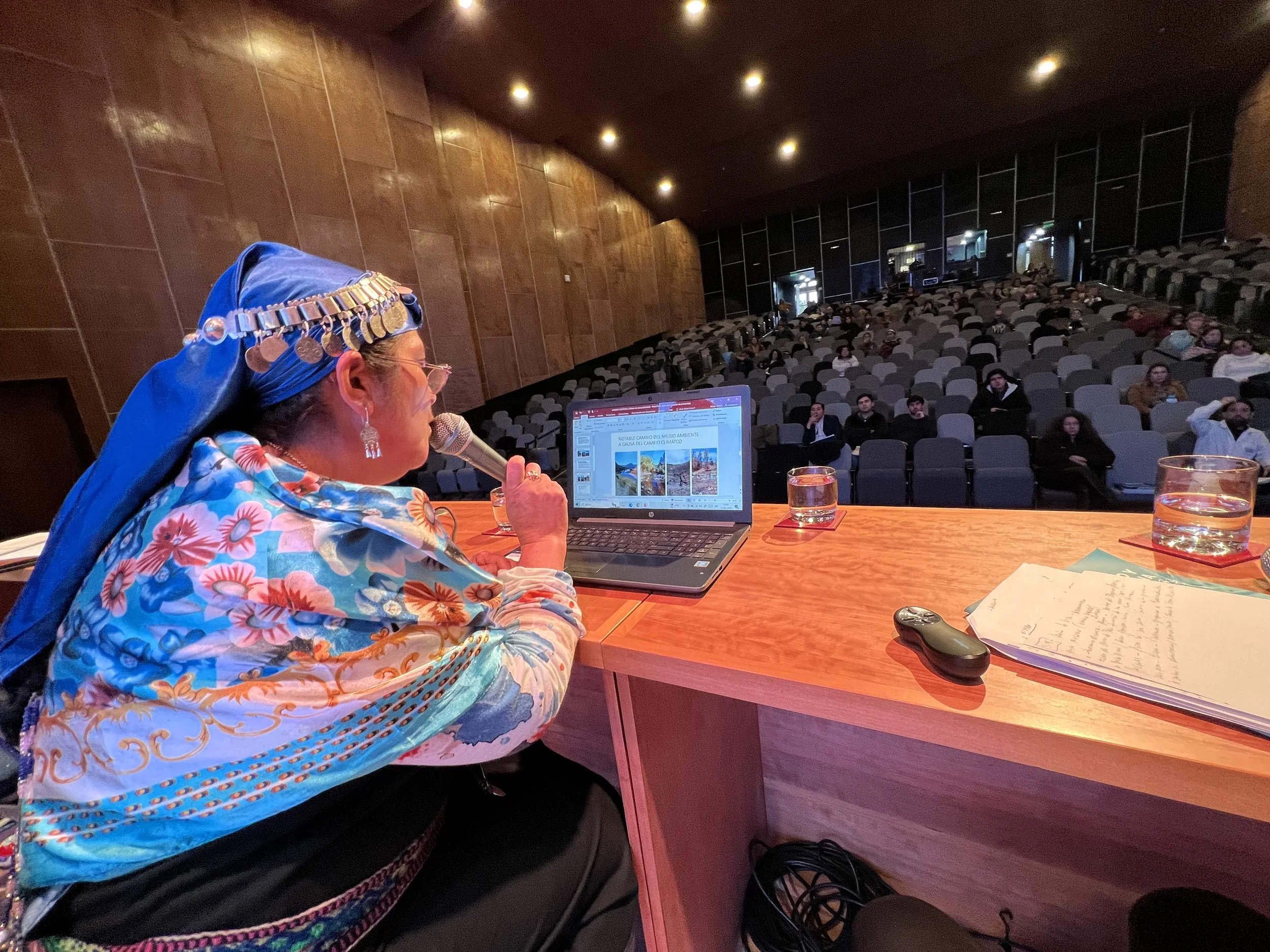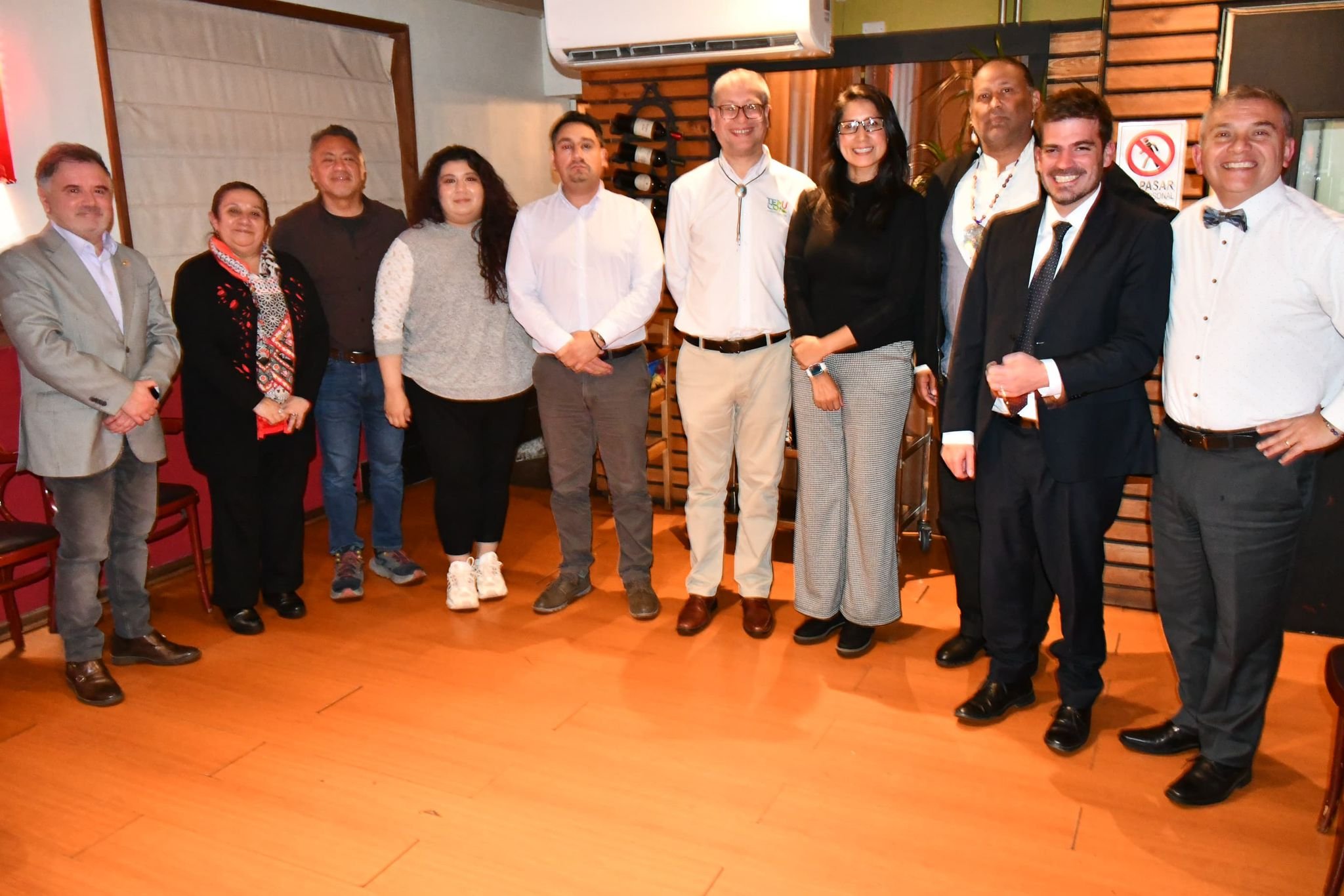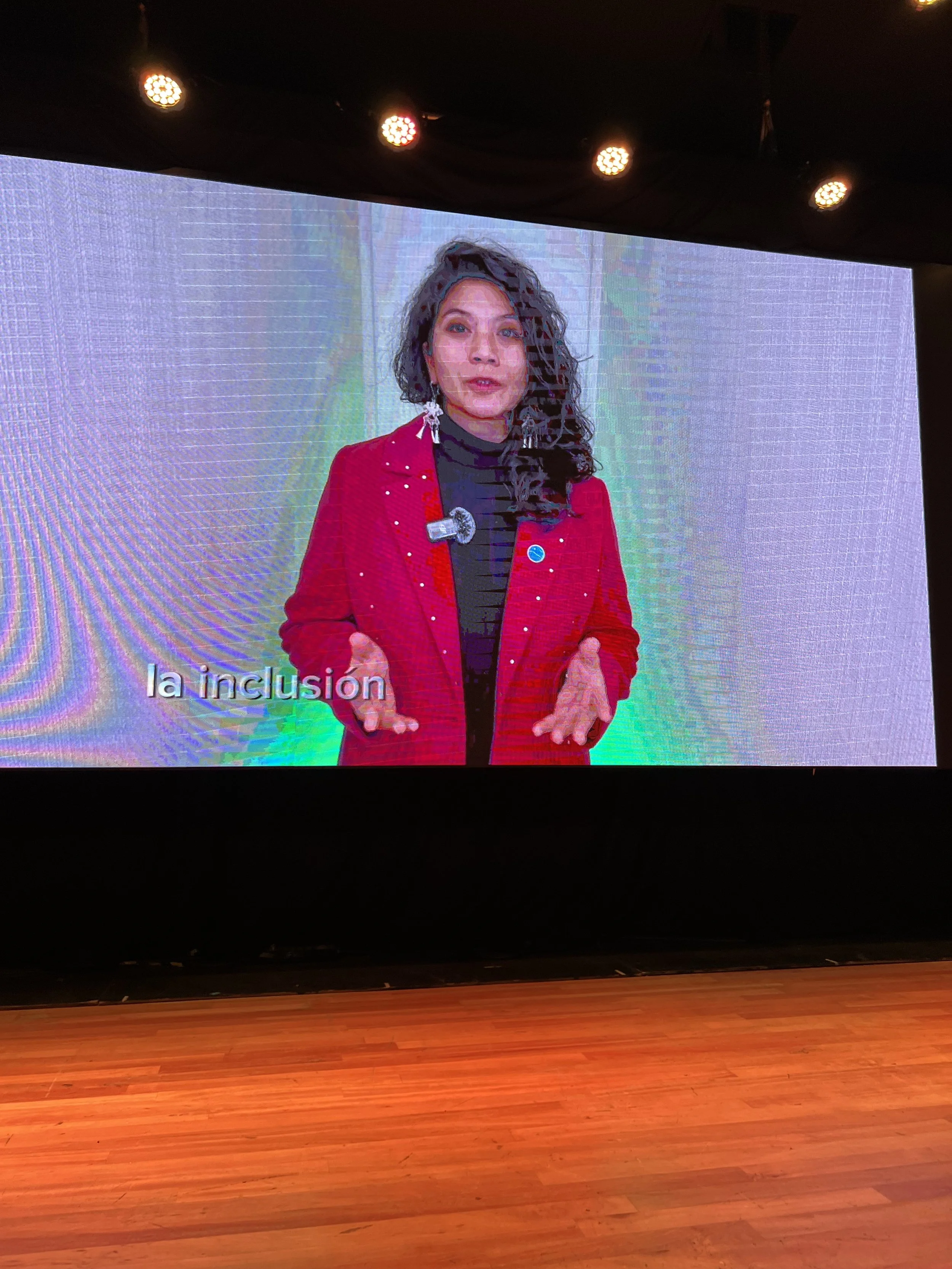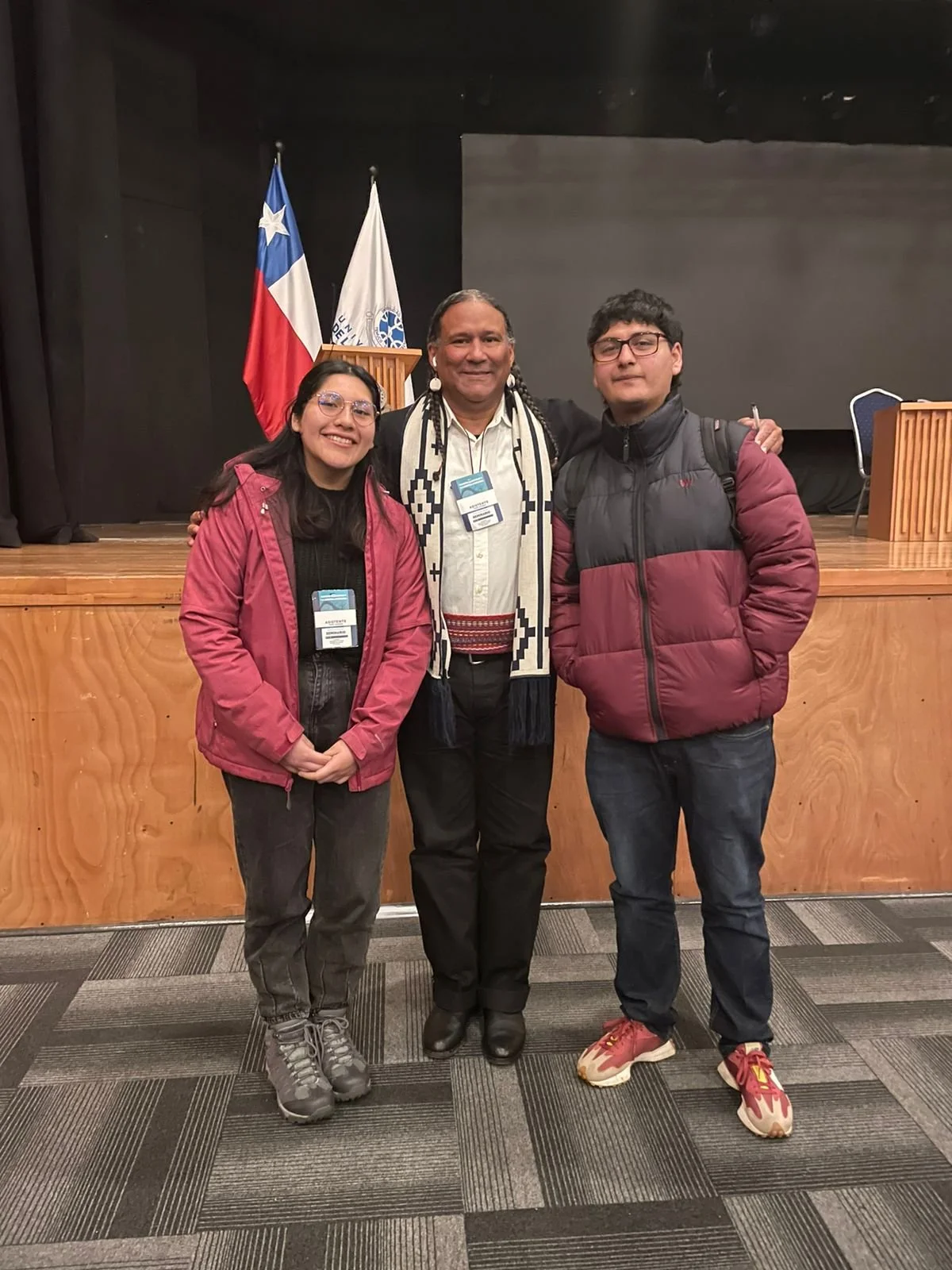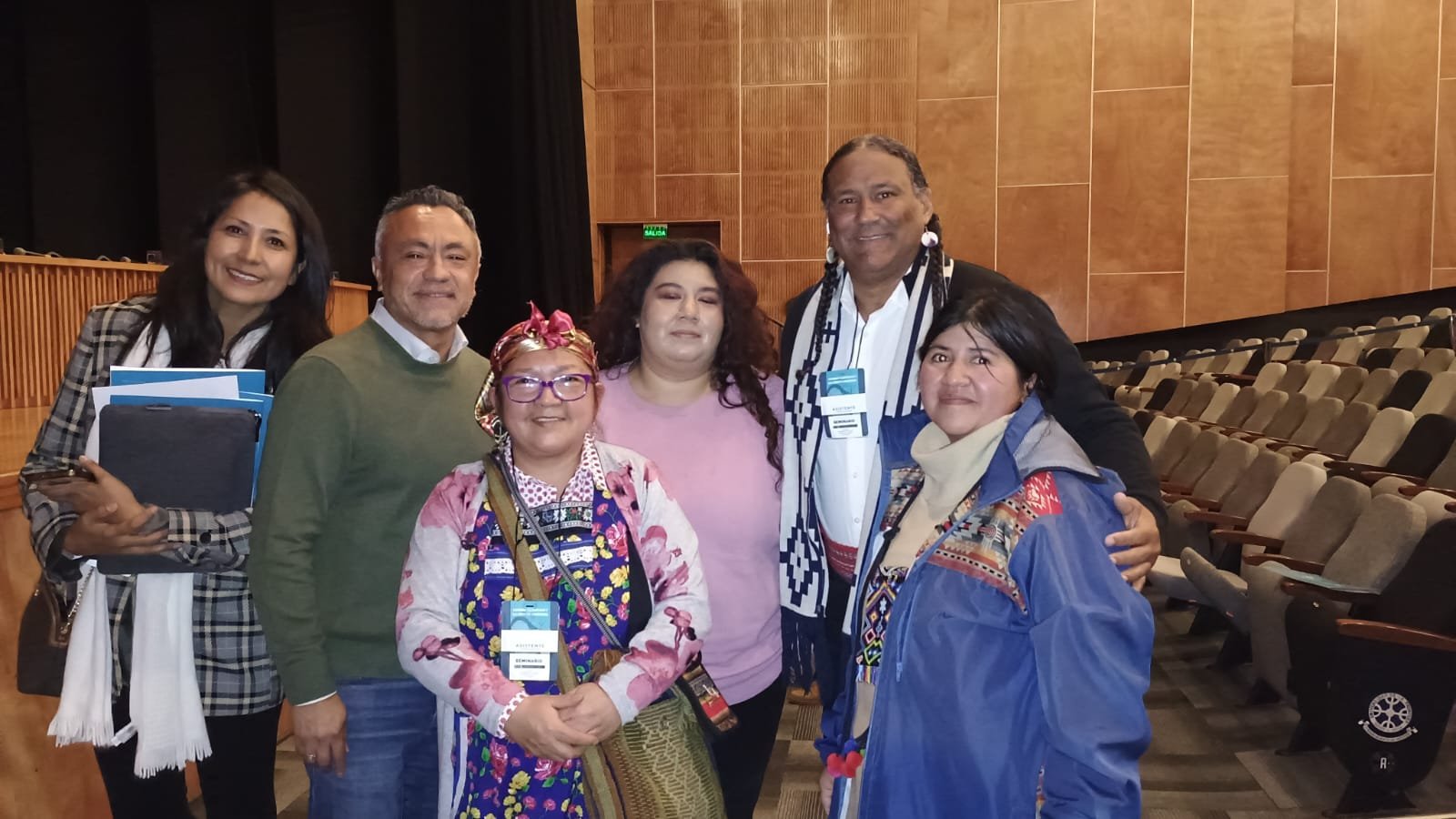CLIMATE CHANGE AND INDIGENOUS SCIENCE SEMINAR
This is a program committed to fostering the inclusion of Indigenous Science in efforts to address the climate crisis and protect biodiversity. This initiative directly supports the United Nations’s call for direct financing of Indigenous Peoples’ led solutions. We are dedicated to empowering Indigenous women and youth by providing information about the necessary tools for their full and effective participation in decision-making processes.
As Secretary of the Interior Deb Haaland affirmed at the UN Permanent Forum on Indigenous Issues (UNPFII) Twenty-Second Session, "Indigenous women and girls are our future, they are best positioned to uplift the needs of their communities and advance Climate Crisis solutions. If we do not empower women everywhere as innovators and leaders, global climate goals cannot truly succeed.”
Our seminars also facilitate international exchanges to foster mutual learning and solidarity among Indigenous Peoples worldwide. For our inaugural seminar in Temuco, within Mapuche ancestral territory, we hosted two members from distinct Indigenous nations in the United States. These exchanges are designed to allow community members to learn from best practices elsewhere and to share their Indigenous Science with the international community, strengthening networks and advancing a rights-based approach to climate action.
Participants learn about international frameworks and collaborate on strategies for climate adaptation and mitigation, with a specific focus on loss and damage. In all our work, we actively promote Indigenous Peoples' fundamental rights, including the right to free, prior, and informed consent (FPIC) and self-determination.
Ultimately, this program emphasizes integrating diverse knowledge systems and empowering Indigenous-led solutions to build a more resilient and just future for all.
A Historic Celebration of Unity and Indigenous Science
The seminar’s agenda was meticulously crafted as a direct result of several months of foundational work, which was a process of free, prior, and informed consultation with community members and leaders. This in-depth engagement, which required a significant investment of personal resources and time by our organization's leadership, was essential to understanding the most pressing subjects and how communities are impacted by the climate crisis. This foundational process ensured that the seminar was not merely a top-down initiative, but a platform built from the ground up, in alignment with the rights of Indigenous Peoples enshrined in the UN Declaration on the Rights of Indigenous Peoples (UNDRIP).
Our first Seminar was a profound celebration of unity and ancestral knowledge. We are deeply grateful for the overwhelming support from all the participants who made our historic first seminar a resounding success. Their presence was fundamental, especially given the challenging weather. The seminar took place during a major storm that caused fallen bridges, isolated communities, and even prompted a yellow alert for the Renaico River to be issued. Despite this complex situation, hundreds of people showed up during the two-day event, demonstrating their resilience and the value they placed on our seminar. We thank them not only for their presence but also for arriving early and staying late into the evening, listening intently, and generously sharing their valuable knowledge.
In a space designed to be inclusive and safe, we were honored to host a wide and diverse audience, including individuals from various fields and backgrounds, professionals, and ancestral authorities. Participants came from all territories, including the Pewenche and Lafkenche, demonstrating a powerful commitment to cross-community solidarity. We are especially grateful for the support of Mapuche women and youth, as well as the participation of Doraliza Millalén, co-administrator of the Mapuche Health Center of the Intercultural Hospital of Nueva Imperial. We also extend a special thanks to Olga Susana Cayul from the Pewenche territory.
The seminar was covered by TVN Araucanía, a national television channel, which highlighted it as the "first international seminar on Climate Change and Indigenous Science" held at the Universidad de La Frontera, with the support of the U.S. Embassy in Santiago. The news report stated that the event featured international speakers and ancestral authorities who addressed topics such as Mapuche medicine, ecosystem changes, and biodiversity. Concerns were also raised about the difficulty in finding traditional medicines due to environmental changes and the impact of global warming, emphasizing the urgency for humanity to collectively address the climate crisis to avoid its disappearance. The news segment also announced that future seminars are planned in other regions such as Arica y Parinacota, Magallanes, and Santiago, with a focus on Rapa Nui, which demonstrates the importance and continuity of the organization's work.
In the interview conducted during the event, the Machi expressed deep concern about the scarcity of traditional medicines, noting that healers are struggling to find the necessary remedies to heal the sick, a situation that contrasts with the past when effective medicines were readily available. For her part, Doraliza Millalén emphasized the importance of communication and sharing experiences about the effects of climate change, describing the daily impact of land degradation and excessive heat on their lives. She warned that the threat of climate change extends to all of humanity, not just indigenous communities, and that collective consciousness and action are needed to address it.
Due to systemic and institutionalized racial discrimination, individuals without extensive formal education or widespread public recognition are often excluded from critical conversations, despite living in the territories and exercising their knowledge daily. They are the ones who suffer the direct impacts of the climate crisis and are therefore most entitled to speak on the issues we brought to the table. Our seminar was explicitly designed to open this space to those who are often left out, which we believe was key to its success. We were honored to provide a secure environment for ancestral authorities to share their profound knowledge and experiences. We were especially honored to have as panelists Lonko Margarita Aillapan Caullam, a Lonko from the Rewe Weycha , and Lonko and activist Alberto Curamil , winner of the Goldman Environmental Prize, and Werkén (Messenger) Carlos Queñenao Coliman of the Lof Marta Cayulef, Lof Ketroleufu, and the Koyangtún Rukapillán. It was a pleasure to witness them speak with such eloquence, truth, and conviction. We also had the honor of having ancestral authorities as guests in our audience.
To ensure our seminar was as inclusive as possible, we facilitated simultaneous interpretation in English and Spanish, which beautifully enabled communication and understanding among all participants. While we deeply regret not having Mapudungun translation, we are committed to making it a priority for future events. We also live-streamed all sessions, recorded them and made them available on our YouTube Chanel, ensuring that those who could not attend in person, but had access to internet could still experience the powerful conversations.
Lidia Arriagada-Garcia, founder and President of Images for Inclusion, and John Scott-Richardson, Director of the organization and a member of the Haliwa-Saponi Nation (with Nansemond/Saponi and Tuscarora lineage), at the National Congress in Valparaíso, Chile. In a gesture of appreciation for their work, they were invited to the 43rd Ordinary Session (372nd Legislature) of the Honorable Chamber of Deputies, held on Tuesday, June 18, 2024.
The far-reaching impact of the seminar was officially recognized at the highest levels of Chilean government. In a gesture of appreciation for their work, Lidia Arriagada-Garcia and John Scott-Richardson were invited to the Honorable Chamber of Deputies in Valparaíso. This invitation, extended by the Honorable Diputada Coca Ericka Ñanco, was a testament to the seminar's success. The Chamber's Committee on Foreign Relations, Inter-parliamentary Affairs, and Latin American Integration sent a formal letter of congratulations to the U.S. Ambassador to Chile, highlighting Lidia's "excellent organization" and the "invaluable contribution" of John's perspective as a member of the Saponi nation. This powerful moment of recognition, which included introductions and applause in the main chamber, demonstrated the seminar’s success in bringing the discussion of Indigenous rights and climate solutions to the forefront of national dialogue and a powerful moment of recognition for their advocacy.
The following is a translation of a letter sent by the Committee on Foreign Relations, Inter-parliamentary Affairs, and Latin American Integration of the Chamber of Deputies of Chile to the U.S. Ambassador in Chile. The letter conveys the committee's gratitude for the successful seminar organized by Images for Inclusion Inc. and highlights the outstanding contributions of Lidia Arriagada García and John Scott Richardson:
CÁMARA DE DIPUTADAS Y DIPUTADOS CHILE
Valparaíso, June 19, 2024. OF. RREE. 117/10/2024
The COMMITTEE ON FOREIGN RELATIONS, INTER-PARLIAMENTARY AFFAIRS, AND LATIN AMERICAN INTEGRATION agreed to send an official letter to Your Excellency , in order to convey the gratitude of its members for the efforts made to carry out the successful seminar organized by the NGO Images for Inclusion Inc. , held on June 11 and 12 at the University of La Frontera in Temuco, named "International Seminar on Indigenous Science and Climate Change."
This seminar, which featured the outstanding participation of community leaders and excellent organization by Lidia Arriagada García, was a significant milestone for the Araucanía region.
Likewise, the visit of John Scott Richardson, belonging to the native Saponi nation, added invaluable value to the event, highlighting the importance of including the perspectives and knowledge of Indigenous Peoples in crucial discussions about climate change and scientific knowledge.
I communicate this to Your Excellency in compliance with the aforementioned agreement and by order of the President of the Committee, Congressman Mr. Vlado Mirosevic Verdugo.
May God keep Your Excellency.
Pedro N. Muga Ramírez Lawyer, Secretary of the Committee
TO THE MOST EXCELLENT MRS. BERNADETTE M. MEEHAN AMBASSADOR OF THE UNITED STATES IN CHILE. Email: santiago-protocobirstate.gov
The spirit of collaboration was also celebrated at a dinner hosted by the Mayor of Temuco, Roberto Neira Aburto, and the Honorable Municipal Council on the evening before the seminar began. We are profoundly grateful for this gesture of appreciation for our international guests. This memorable event highlighted Temuco's commitment to intercultural dialogue. A significant moment of cultural exchange occurred when John presented the Mayor with a Native American garment as a gesture of gratitude from his Indigenous nation, which the Mayor proudly wore.
The seminar's engagement with regional government bodies was further demonstrated by a video presentation from Félix Contreras, the SEREMI del Medio Ambiente (Regional Ministerial Secretary of the Environment). Speaking from Baja California, Mexico, Mr. Contreras extended a special greeting to all participants, emphasizing that effective decisions on the climate crisis cannot be made in isolation. He highlighted the importance of receiving and incorporating the distinct worldview of the Mapuche people into climate action, underscoring the critical need for collaborative efforts among all organizations and communities. His message contributed to the discussion on the national Climate Change Framework Law (Ley 21.455) and the inclusion of Indigenous Science. His participation highlighted the importance of collaboration between civil society and regional authorities to advance inclusive environmental policies.
Video presentation by the Special Rapporteur on the Rights of Indigenous Peoples, Francisco Calí Tzay, exclusively for our First Seminar Climate Change and Indigenous Science. June 11, 2024. (Spanish language)
Our seminar was opened with a powerful video message from the Special Rapporteur on the rights of Indigenous Peoples, Mr. José Francisco Calí Tzay. The role of a Special Rapporteur is a crucial part of the United Nations' human rights system, established to address specific human rights situations and promote good practices. The mandate for the Special Rapporteur on the rights of Indigenous Peoples was created in 2001 to respond to the consequences of historical colonization and discrimination that Indigenous communities face globally. A Special Rapporteur is tasked with promoting the implementation of international standards, making recommendations to prevent and remedy rights violations, reporting on human rights situations, and addressing specific cases of alleged violations.
Our initial plan, which included confirmed attendance and already purchased flights for Mr. Calí Tzay and his legal advisor, Dr. Elisa Marchi, had to be postponed due to circumstances beyond our control. The event's rescheduling, combined with his extensive international commitments, meant that his in-person participation was not possible. His support, however, was invaluable. His participation in the opening ceremony, even in a pre-recorded format, underscored the importance of our seminar's goals and provided a strong foundation for the discussions that followed. In his address, he highlighted that Indigenous knowledge is scientific and should be incorporated into public policies on climate change and conservation. Mr. Calí Tzay drew on his 2022 report, which focused on the critical role of Indigenous women in transmitting and conserving scientific and technical knowledge, and his 2023 report to the Human Rights Council, which stressed the necessity of a human-rights-based approach to green finance. He warned that while a shift to green energy is urgent, it must not replicate the human rights violations seen in extractive industries and must ensure the protection of the fundamental rights of Indigenous Peoples, including their consultation, consent, and meaningful participation. He further emphasized that states, international financial institutions, and the private sector have a fundamental role to ensure that Indigenous Peoples have the right to give or withhold their free, prior, and informed consent for projects that affect them and their territories.
The seminar's direct connection to the highest levels of international dialogue was further cemented by the participation of Mr. Darío Mejía Montalvo, a distinguished leader and the esteemed President of the UN Permanent Forum on Indigenous Issues. Mr. Mejía Montalvo, who holds a master's degree in Development Management and has been a fundamental actor in public policy for Indigenous Peoples, joined us via a last-minute video call. We made the conscious decision to briefly adjust our program to accommodate his availability, showcasing our commitment to ensuring that Indigenous voices are heard on the international stage. His powerful remarks underscored the critical support that a global body like the UN Permanent Forum gives to grassroots initiatives that defend and promote Indigenous Science, the need for direct financing, and the full and effective participation of Indigenous Peoples in consultations and decision-making on climate change issues that affect them. His presence symbolized a vital bridge between international policy and the lived realities of Indigenous communities on the ground.
The seminar’s essential importance in bridging Indigenous knowledge with national legislative and legal frameworks was powerfully demonstrated through the contributions of two key Mapuche figures. We were honored to feature the pre-recorded video insights of the Honorable Deputy Coca Ericka Ñanco (Mapuche), who represents District Nº 23, whose contribution centered on the inclusion of Indigenous women and girls in decision-making processes. Additionally, Salvador Millaleo, a respected Mapuche lawyer, university professor, and human rights specialist, joined us via a video call to offer his legal expertise on the national Climate Change Framework Law and the inclusion of Indigenous Science. As a lawyer and professor at the University of Chile with a PhD in Sociology, and a former advisor to the Constitutional Convention, his insights were invaluable. We are deeply grateful for their essential contributions, which underscored the importance of fostering Indigenous Science in both political and juridical action.
Our seminar served as a vital platform for dialogue and Indigenous-led solutions that build a more resilient and just future. It culminated in a beautiful and emotional closing ceremony, where music and dance were shared in a powerful moment of cultural unity.
We also issued certificates of participation to all attendees, a document that holds significant value. Beyond simply crediting attendance, the certificate serves to validate knowledge on the intersection of climate change and Indigenous Science, a topic of growing global relevance. It promotes intercultural dialogue, strengthens professional and academic profiles, and encourages participants to influence public policy and take action in their communities. The certificate also aids in building a network among diverse participants—from academics to ancestral authorities—facilitating future collaborations and reinforcing our commitment to building a just and equitable future for all.
The success of the seminar was amplified by significant media attention, demonstrating the widespread interest in the inclusion of Indigenous Science in climate solutions. We were honored to have our event covered by TVN Red Araucanía on their social media platforms, as well as by local online newspapers and Instagram accounts like Qué Pasa Araucanía and Novena Digital. This extensive coverage ensured our message reached a broad audience throughout the region and beyond, providing information to the public before, during, and after the event.
“Temuco: successful seminar on climate change and indigenous science
• Successfully concluded the "Seminar on Climate Change and Indigenous Science" organized by the NGO based in New York, United States, Images for Inclusion, held in the city of Temuco.“The meeting took place on June 11 and 12 in the Aula Magna of the University of La Frontera, which was supported by the Embassy of the United States in Santiago, and focused on the importance of using the ancestral knowledge of Indigenous Peoples to face the challenges of climate change, analyzing good practices in the United States and creating alliances for economic and social inclusion for the benefit of all people, flora and fauna worldwide.
Arriagada explained that the seminar brought together climate change experts, indigenous leaders, representatives from various environmental organizations, guests from Native American nations in the United States and representatives from the United Nations, fostering a positive exchange of ideas.”
— Newspaper: El Austral
In a further testament to our commitment to empowering Indigenous women and youth, we were proud to award a prize to the winning idea from our seminar's non-monetary contest. The winner, Valeska Inés Marivil Carril, a young Mapuche preschool teacher from Nueva Imperial, proposed creating a garden with lawen (Mapuche medicinal herbs) at her preschool. This initiative, titled "Proyecto Lawen en mi Jardín Copihuito," seeks to use ancestral knowledge to combat climate change, promote interculturality, and preserve biodiversity. The project was awarded a prize of $1,000 to help implement her vision. This recognition and direct financial support for a Mapuche woman's initiative underscores the importance of funding Indigenous-led solutions. The news of her win received considerable media attention, including coverage on TVN Red Araucanía during our in-person award ceremony and a feature in the newspaper El Austral. Her story was also shared on online news platforms, including QPA/ Que Pasa Araucanía (https://www.instagram.com/p/DAYreR8x62G/?utm_source=ig_web_copy_link&igsh=MzRlODBiNWFlZA==) and Novena_digital (https://www.instagram.com/p/DAV8sZXNrAX/?utm_source=ig_web_copy_link&igsh=MzRlODBiNWFlZA==).
Finally, we extend our heartfelt gratitude to the dedicated team of assistants whose tireless work and professionalism were essential to the smooth execution of our seminar. Their efforts were crucial in managing event logistics, assisting with the distribution of materials, and ensuring a calm and respectful environment for all. We are especially thankful for their kindness and their commitment to working long hours to ensure every detail was handled, even late into the night. Their support was invaluable in managing a challenging situation where a group of individuals temporarily disrupted the event and took over the stage for an hour. Their calm and respectful demeanor in keeping us informed and helping to resolve the matter was fundamental to the seminar’s success and helped create a productive environment for all participants. We offer our sincerest thanks for their invaluable contribution to making this historic event possible.
We invite you to watch the full recordings of this historic seminar on our YouTube channel to experience these powerful conversations for yourselves:
Day 1, Part 1: https://www.youtube.com/live/EXsyyp0Qsw4?feature=shared
Day 1, Part 2: https://www.youtube.com/live/lspEwZ95kqI?feature=shared
Day 2, Part 1: https://www.youtube.com/live/RRZaIO0OHUI?feature=shared
Day 2, Part 2: https://www.youtube.com/live/IIFuQGZRmgc?feature=shared
To learn more about the crucial issues that motivated our seminar and our call for support, you can watch our promotional video here: https://youtu.be/urrJn1_Pip0?feature=shared
This video highlights the urgent injustices faced by Indigenous Peoples globally, including the loss of land, rights, and resources, which contributes to significant inequalities. It stresses the profound connection between human and planetary health and the rights of Indigenous Peoples, who, despite their minimal contribution to the climate crisis, are on its front lines. The video also underscores that Indigenous Peoples hold many of the solutions to the climate crisis and are the guardians of biodiversity. It concludes with a powerful call to action, urging us to embrace and learn from their wisdom, knowledge, and leadership to work together towards a more peaceful, sustainable, and prosperous future for all.
